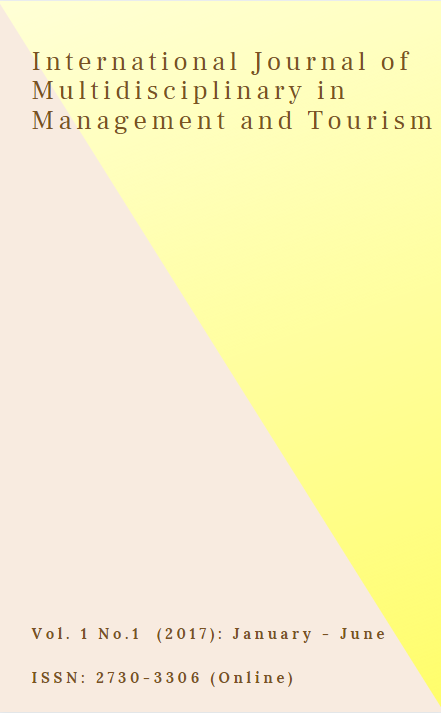The Innovative Model of Communication Based on Buddhism for the Development of Farmer towards Sufficiency Economy
Main Article Content
Abstract
This Innovative Model of Communication is based on Buddhism for the development of the farmers towards Sufficiency Economy. This research aims (1) to study the process of farmers’ development based on the Buddhist way and implementation through current telecommunicational technologies, (2) to describe the development of well-balanced happiness in connection to sustainabile agriculture; this is manifested in the quality of and and the development of a communicational model for Farmers towards Sufficiency Economy. A qualitative method called documentary analysis is employed.
This research found out that, 1. the goals of sustainable development for farmers, imbibed through five economic theoretical frameworks from ten editions of National Economic and Social Development Plan, are not present nor applied before the usage of the current telecommunications technology. 2. The need for the development of the farmers and the response towards developmental factors are balanced based on the examination of the effects on the economy, education, faith, confidence, social participation and quality of life. 3. Dhamma principles, connected to Buddhist economics, have to be modified in pursuit of farmers’ success.This should coincide with communication based on Buddhism in order to reach a a point of balance. This will enable farmers to modify or change their behaviors towards enhanced intellect and lasting happiness. 4. Management is responsible for the synthesis of the principles of CSR, and factors making up this development model. There has to be a balance of demand and supply that has to be connected to the main objectives. Lastly, the Innovative Model of Communication based on Buddhism for the Development of Farmers towards Sufficiency Economy Philosophy was developed through these conditions.
Moderation is applied to production theory. Marketing and consumption from mainstream economic effects were directed by the Buddhist economics and Buddhist principles of the Middle Path (Majjhimãpaṭipadã), the Noble Eightfold Path (Aṭṭhañgika Magga), the Threefold Training (Trisikkhã), the Chain of Causation (Paṭiccasamuppāda), the Seven Qualities of a Good Man (Sappurisadhamma), the Five Precepts (Pañcasila) and the Five Dharma (Pañcadhama). Rationality is regulated through thorough Contemplation (Yonisomanasikāra), the Three Characteristics (Tilakkhaña), the Four-fold Noble Truths (Catu-Ariyasacca), the Four Principles of Success (Catu-Iddhipāda), the Four Principles of Social Integration (Catu-Sangahavatthu) and the Four Principles of VirtuousExistence(Catu-Brabmavihāra).Self-Immunity Supervised by Mindfulness (Sati-Appamādadhamma) and True Good Friends (Kalyāṇamittatadhamma) based on a strong base of knowledge and morality condition are controlled by the people of knowledge (Bahusutta), Six Channels of Sense (Ãyatanas) that are controlled by the moral shame (Hiri) and the fear of sin against corruption (Ottappa) are deemed as a starting point. The model for the completion of factors of development and the needs for development are based on the balance of demand and supply.
In this light, the Innovative Model of Communication based on Buddhism for the Development of the Farmers towards Sufficiency Economy Philosophy consists of five main theories, 15 principles of Dharma and the evaluation of 15 indexes. The innovative model in this research can also be used in different countries despite differences in the mode of economy, society, environment and culture. This is because of the syntheses of these natural principles are the Dharmas.
Article Details
References
E.F. Schumacher. (1993). Small is Beautiful. London: Vintage.
Ellis, T. (2010). The New Pioneers: Sustainable Business Success Through Social Innovation and Social Entrepreneurship. United Kingdom: Wiley.
Etsko, S. (2004). Leadership: The Care and Growth Model. (2nd ed.). USA: Ampersand Press.
Kasem, W. and Isarangkul Na Ayudhya, C. (2012). CSR by Sufficiency Economy. Bangkok: Daoreuk Communications Printing.
King Bhumibol Adulyadej. (2012). A Life’s Work. Thailand’s Monarchy in Perspective. The Second Edition. Thailand: Sirivanata Interprint Public.
Phra Brahmagunabhorn. (P. A. Payutto). (2010). Buddhist Economics. (5th ed.) Bangkok: Sahathammika.
Phra Dhammakosajarn. (1990). The Farming by Buddha. Bangkok: MCU Press.
Yodpruttakarn, P. (2006). The use of the process of construction of indicators in comparing sufficiency economy and Buddhist Economics(A Dissertation). Graduate School, Mahachulalongkorntajavidyalaya University.

